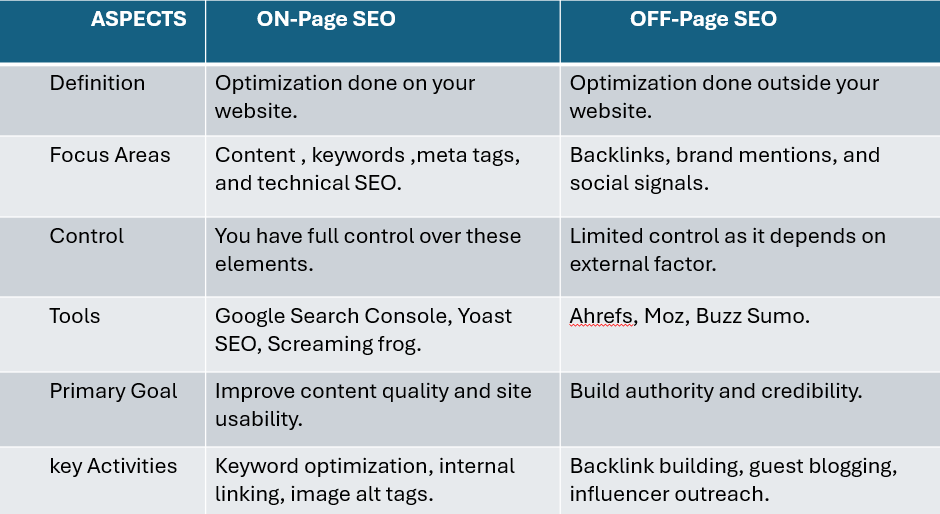Difference Between On-Page and Off-Page SEO
Search Engine Optimization (SEO) is a key part of digital marketing Search Engine Optimization (SEO) is a key part of digital marketing. It helps businesses become more visible online and brings in natural traffic. SEO falls into two main categories: on-page SEO and off-page SEO. Both are important for ranking well on search engines, but they focus on different areas of improvement. This blog post explains the differences between on-page and off-page SEO and how to use both to make your website better.
What is On-Page SEO?
On-page SEO is a technique that is used for optimizing individual web pages to rank higher and earn more relevant traffic in search engines. In search engine optimization, like Google, Yahoo, and Bing on-page optimization refers to a factor that affects your website and web page listing in the natural search results.
**Key Elements of On-Page SEO **:
1. **Keyword Use**: Find and use the right keywords in your content, titles, meta tags, and URLs to match what people are searching for.
2. **Good Content**: Make interesting, helpful, and unique content that answers users’ questions and solves their problems.
3. **Titles and Descriptions**: Create interesting titles and descriptions that use your main keywords to get more people to click on your page.
4. **Headings**: Structure your content with headings (H1, H2 H3) to make it easy for readers and search engines to understand.
5. **Internal Links**: Add links to other related pages on your site to help users find more information and improve your site’s structure.
6. **Image Optimization**: Make images smaller in size, use simple file names, and add alt text to speed up your site and make it more user-friendly.
7. **Fast Loading and Mobile-Friendly**: Make sure your website loads quickly and works well on mobile devices to give users a smooth experience on any device.
8. Technical SEO: Improve the technical parts of your website, like how URLs are set up, adding structured data, and creating XML sitemaps.
**Benefits of On-Page SEO:**
Makes it easier for search engines to understand your content.
Makes the user experience (UX) better.
Boosts the chances of ranking for specific keywords.
What is Off-Page SEO?
Off-page optimization refers to the technique that can be used to improve the position of a website on a search engine results page (SERPS). Many people associate off-page SEO with link building but it is not only that. It is also used in promotion methods like blogging, website design, social bookmarking, etc.
**Key Elements of Off-Page SEO :**
1. **Backlink Building**: Get high-quality links from trusted websites to improve your domain authority.
2. **Social Media Marketing**: Share your content on social media to engage users and bring more visitors to your site.
3. **Guest Blogging**: Write articles for other websites and include links back to your site.
4. **Brand Mentions**: Get your brand mentioned on blogs, forums, and news sites to build recognition.
5. **Online Reviews**: Encourage customers to leave positive reviews on platforms like Google My Business and Yelp.
6. **Influencer Outreach**: Work with influencers to promote your brand.
Benefits of Off-Page SEO:
- Boosts your website’s credibility and trust.
- Makes your brand more visible and well-known.
- Helps your site rank better for tough keywords.
On-page SEO Vs Off-page SEO

CONCLUSION
On-page SEO and off-page SEO are two different methods with different goals and ways of doing things, but both are important for getting a good search ranking. On-page SEO helps make your website better for both search engines and users, while off-page SEO builds trust and authority through actions outside your website.
By learning and using both, you can create a strong SEO plan that brings more visitors, improves your rankings, and helps your online presence grow. Keep in mind, SEO takes time—staying consistent and being patient are the keys to success!
